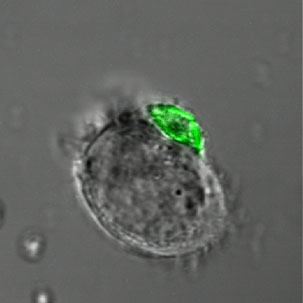The system releases the drug only inside the cell, using the "Trojan horse" approach

Technion researchers have developed a nanometer system consisting of a chemical coupling between polysaccharide, extracted from the cypress tree, vitamin folic acid and an anti-cancer drug. The system leads the drug directly to the cancer cell and releases it only inside it. In this way, the cancer cell is destroyed without causing any damage to the healthy cells around it. The development was published in the latest issue of the scientific journal Biomacromolecules.
The system was developed by Technion researchers, Dr. Yoav Livni from the Faculty of Biotechnology and Food Engineering and Professor Yehuda Asraf, head of the Fred Vishkovski Cancer Research Laboratory from the Faculty of Biology, in collaboration with Professor Avi Domb from the School of Pharmacy at the Hebrew University of Jerusalem. "We were looking for a polymer that would be easy to dissolve in water and found suitable a polysaccharide polymer called arabino-galactan, extracted from the cypress tree," explain Prof. Asraf and Dr. Livni. "Compared to healthy body cells, cancer cells produce a much larger number of receptors to bind folic acid, as cancer cells need this vitamin for their rapid growth and reproduction. Therefore, it is an effective 'bait' to be used as a 'homing' mechanism for the cancer cell, in the "Trojan horse" approach. After the folic acid binds to the receptor, a process called endocytosis takes place, where part of the cell membrane (membrane) folds towards the inside of the cell and creates a cavity which becomes an intracellular vesicle called an endosome. After that, the endosome fuses with another intracellular organelle called a lysosome, which is rich in enzymes that digest the contents of the vesicle (a sort of digestive system of the cell)."
The researchers attached the anti-cancer drug to the polysaccharide polymer by a segment of protein (peptide) which was digested by protein-digesting enzymes found in the lysosome. Since there are no enzymes in the blood capable of breaking down this specific peptide, the drug is only released inside the lysosome.
The Technion development is expected to be particularly effective against ovarian, kidney and uterine cancer, which are characterized by increased production of folic acid receptors. In the future, this innovative system will be able to carry several anti-cancer drugs, the combination of which will produce a synergistic effect for optimal destruction of the malignant tumor cells.

6 תגובות
I wish the researchers success and quick implementation
I asked - is it implied that women starting at a certain age should consume less folic acid, so as not to feed cancer cells that may be found in their bodies?
rejuvenation
Wow, well done.
Amazing! Well done, I hope it will soon become feasible
Amazing and essential, we must find better solutions than the ones that exist today. Kudos to the researchers!
Is there an estimate for when it will be usable?
Well done!!
Amazing work in my opinion...